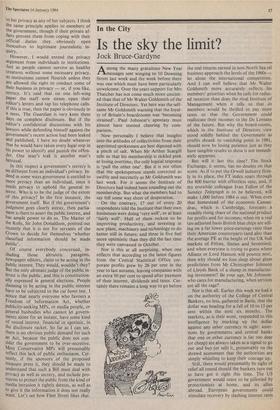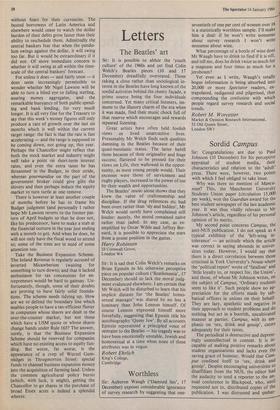In the City
Is the sky the limit?
Jock Bruce-Gardyne
Among the many gratuitous New Year messages sent winging to 10 Downing Street last week and the week before there was one which must have been particularly unwelcome. Over the years support for Mrs Thatcher has not come much more unstint- ed than that of Mr Walter Goldsmith of the Institute of Directors. Yet here was the self- same Mr Goldsmith warning that the loyal- ty of Britain's boardrooms was `becoming strained'. Paul Johnson's apostasy must almost have seemed cheering by com- parison.
Now personally I believe that insights into the attitudes of collectivities from their appointed spokesmen are best digested with a pinch of salt. When Mr Arthur Scargill tells us that his membership is tickled pink at losing overtime, the only logical response is 'pull the other one'. But it is not often that the spokesperson stands corrected as swiftly and succinctly as Mr Goldsmith was last week. For it seems the Institute of Directors had indeed been sounding out the membership. But what the members had to say fell some way short of desperation.
On the contrary, 17 out of every 20 respondents told the Institute that their own businesses were doing 'very well', or at least 'fairly well'. Half of them reckon to be improving productivity, and investing in new plant, machinery and technology to do better still in future; and three in five feel more optimistic than they did the last time they were canvassed in October.
Nor is this at all surprising, when one reflects that according to the latest figures from the Central Statistical Office cor- porate profits grew by 26 per cent in the year to last autumn, leaving companies with an extra 50 per cent to spend after payment of their interest, dividends and taxes. Cer- tainly there remains a long way to go before the real returns earned in non-North Sea oil business approach the levels of the 1960s - let alone the international competition.
And I can well believe that Mr Walter Goldsmith more accurately reflects his members' priorities when he calls for reduc-
ed taxation than does the rival Institute of Management when it tells us that its
members would be thrilled to pay more taxes so that the Government could reallocate their incomes to the De Loreans of the future. But why the board-rooms, which in the Institute of Directors view stood solidly behind the Government as profits shrank to vanishing point in 1981, should now be losing patience just as they have tangible results to show is not immedi- ately apparent.
But will it last this time? The Stock Exchange, it seems, has no doubts on that score. As if to put the Orwell industry firm- ly in its place, the FT index soars through the 800 barrier with effortless ease, and, if my erstwhile colleague Ivan Fallon of the
Sunday Telegraph is to be believed, will make 1,000 before 1984 is out. When even
that homestead of the economic Cassan- dras, which is Cambridge, forecasts a steadily rising share of the national product for profits and for incomes; when on a real tax-adjusted basis British blue chips are sell- ing on a far lower price-earnings ratio than their American counterparts (and also than the average PE at the height of the UK bull markets of Fifties, Sixties and Seventies); and when everyone is trying to guess where Allianz or Lord Hanson will pounce next, then why should we lose sleep about glum predictions from Mr Christopher Johnson of Lloyds Bank of a slump in manufactur- ing investment? Be your age, Mr Johnson: who cares for manufacturing, when services are all the rage?
Nor is this all. Earlier this week we had it on the authority of the College of Central Bankers, no less, gathered in Basle, that the dollar was heading for a fall of 10 to 15 per cent within the next six months. The markets, as is their wont, responded to this intelligence by marking up the dollar against any other currency in sight: asser- tions by governments and central banks that one or other currency is far too dear (or cheap) are always taken as a signal to go out and buy (or sell) it, presumably on the shrewd assessment that the authorities are simply whistling to keep their courage up.
Still, there would presumably be sighs of relief all round should the bankers turn out to have got it right this time. The US government would cease to be pilloried by protectionists at home, and its allies abroad. European governments could stimulate recovery by slashing interest rates without fears for their currencies. The busted borrowers of Latin America and elsewhere would cease to watch the dollar burden of their debts grow faster than their ability to reschedule them. Admittedly the central bankers fear that when the pendu- lum swings against the dollar, it will swing too far. But it would be extraordinary if it did not. Of more immediate concern is whether it will swing at all within the time- scale of the central bankers' forecast.
For unless it does — and fairly soon — it does seem increasingly permissible to wonder whether Mr Nigel Lawson will be able to turn a blind eye to falling sterling, soaring money aggregates, and the remarkable buoyancy of both public spend- ing and bank lending, for very much longer. It is all very fine for the Treasury to say that this week's money figures still only produce a rate of growth over the last six months which is well within the current target range: the fact is that the rate is fast accelerating — and the range is supposed to be coming down, not going up, this year. Perhaps the Chancellor might reflect that both the stock market and industry might well take a point on short-term interest rates, and even the extra taxes he has threatened in the Budget, in their stride, whereas gourmandise on the part of the government broker could give gilts the shivers and then perhaps induce the equity market to turn turtle at one remove.
There is however at least another couple of months before he has to frame his Budget judgment (and personally I rather hope Mr Lawson reverts to the former pat- tern of April budgets so that he does not, like his predecessor, have to make a stab at the financial outturn in the year just ending with a month to go). And when he does, he will not only have the fiscal wood to attend to; some of the trees are in need of some attention too.
Take the Business Expansion Scheme. The Inland Revenue is regularly accused of inverted Micawberism (waiting for something to turn down); and that it lacked enthusiasm for tax concessions for en- trepreneurs would be hard to gainsay. Un- fortunately, though, some of their doubts are proving to have fairly solid founda- tions. The scheme needs tidying up. How are we to defend the boundary line which enables people to have a tax-efficient flutter in companies whose shares are dealt in the over-the-counter market, but not those which have a USM quote or whose shares change hands under Rule 163? The answer, surely, is that the Business Expansion Scheme should be reserved for companies which have no existing access to equity fun- ding. But worse, far worse, is the appearance of a crop of Wurzel Gum- midges in Throgmorton Street: special funds to channel business expansion money into the acquisition of farming land. Unless the common agricultural policy bursts (which, with luck, it might), getting the Chancellor to go shares in the purchase of broad Essex acres is indeed a splendid wheeze.







































 Previous page
Previous page